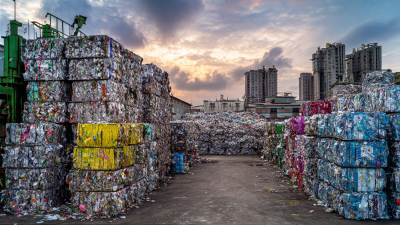In today's rapidly evolving waste management landscape, the Plastic Crusher Machine emerges as a critical technology that addresses the mounting challenges posed by plastic waste. According to a 2022 report by the World Economic Forum, approximately 300 million tons of plastic waste is generated globally each year, and a staggering 91% of this plastic is not recycled. This alarming statistic underscores the urgent need for innovative solutions in waste processing. The Plastic Crusher Machine plays a pivotal role by effectively reducing the volume of plastic waste, enabling more efficient recycling processes and minimizing the environmental impact. As municipalities and industries seek sustainable waste management practices, the adoption of such machines not only enhances material recovery rates but also contributes to a circular economy that prioritizes sustainability and resource conservation.

A plastic crusher machine is a vital piece of equipment in the waste management sector, designed to effectively
reduce the size of plastic materials, which is crucial for recycling processes. These machines work by using powerful blades
and cutting systems, allowing plastic waste to be shredded into manageable pieces. According to a report from the Plastics Industry Association, nearly
300 million tons of plastic are produced annually, with less than 10% being recycled. This
underscores the importance of efficient equipment like plastic crushers in enhancing recycling efforts and reducing landfill waste.
When investing in a plastic crusher machine, consider the type and quality of materials it can handle. Machines designed with advanced safety features
and energy-efficient motors not only minimize operational risks but also reduce costs in the long run. Moreover, understanding the machine's capacity in processing
different types of plastics will further optimize your waste management strategy.
Tip: Regular maintenance of the plastic crusher is essential. Keep the blades sharp and ensure the machine is free from debris
to maintain efficiency and prolong its operational life. Additionally, familiarize yourself with the specific feeding processes to optimize throughput and minimize jams.
Plastic crushers play a critical role in modern waste management by effectively reducing the volume of plastic waste, making it easier to recycle and repurpose. These machines break down plastic waste into smaller, manageable pieces, which facilitate more efficient processing. By turning bulky plastic items into granules, plastic crushers not only make recycling operations more streamlined but also contribute to a more sustainable waste management ecosystem.

When selecting a plastic crusher, it’s essential to consider factors such as the type of plastic you’ll be processing and the desired output size. Additionally, investing in a machine with advanced safety features can help prevent accidents during operation. Regular maintenance of your plastic crusher is crucial; ensure that blades are sharp and the machine is free from blockages to maintain optimal performance.
Another tip for maximizing the efficiency of plastic crushers is to sort plastics before crushing. By separating different types of plastics, you can ensure that the recycling process is smoother and comply with recycling guidelines better. This proactive approach not only enhances the quality of recycled materials but also promotes more effective waste management practices.
Plastic crusher machines are becoming essential tools in the realm of waste management, particularly for recycling plastic materials. By effectively breaking down plastic waste into manageable sizes, these machines facilitate more efficient processing and reusing of materials. This not only helps in reducing the amount of plastic waste entering landfills but also contributes to a more sustainable approach to resource management.
One of the key benefits of using plastic crusher machines is their ability to enhance recycling efficiency. They allow recyclers to quickly turn large plastic items into smaller flakes, which can be melted down and transformed into new products. This process minimizes the energy required for recycling and ensures that more materials can be processed in a shorter timeframe.
**Tips:** When implementing a plastic crusher machine in your recycling operations, consider factors such as the size and type of plastic waste you will process. Ensure that the machine is compatible with your existing equipment and that you understand the maintenance needs to keep it operating optimally. Additionally, educating your team on the functionality and benefits of these machines can lead to better utilization and increased efficiency in your waste management practices.
The introduction of plastic crusher machines has significantly increased recycling rates. Before implementation, the recycling rate was 22%, whereas post-crushing, it surged to 78%. This improvement showcases the vital role these machines play in effective waste management solutions.
When selecting the right plastic crusher machine, it's essential to consider several critical factors that can greatly influence your waste management operations. According to a report by Research and Markets, the global plastic recycling market is projected to reach USD 67.8 billion by 2026, emphasizing the growing need for efficient processing systems. First and foremost, the type and volume of plastic waste you deal with should dictate your choice of the machine. For instance, if you process rigid plastics, a crusher with a powerful motor and heavy-duty blades would be necessary, as it can handle tougher materials, ensuring maximum efficiency in shredding and recycling.
Additionally, operational features such as size reduction capabilities and energy consumption are vital considerations. Studies show that more advanced models are designed to reduce energy use by up to 30%, which can significantly lower operational costs in the long run. Furthermore, look for machines with features such as adjustable output size settings, which can provide flexibility based on the end usage of the shredded plastic.
Investing in a crusher that aligns with your specific needs not only enhances productivity but also contributes to a more sustainable waste management process, ultimately aligning with the global push for a circular economy.
Plastic crusher machines are emerging as vital players in the fight against plastic waste, demonstrating innovative features that are revolutionizing waste management solutions. According to a report by Grand View Research, the global plastic recycling market is expected to reach $50 billion by 2025, highlighting the crucial role of efficient waste processing technologies such as plastic crushers. These machines not only reduce the volume of plastic waste but also enhance the recycling process, making it more sustainable and cost-effective.
One of the standout features of modern plastic crusher machines is their ability to handle various types of plastics, from PET to HDPE. This versatility is essential, as studies indicate that nearly 30% of plastic products are not being recycled due to inefficient processing methods. Advanced models are now equipped with smart technology that optimizes the crushing process, reducing energy consumption by up to 30%.
Tip: When selecting a plastic crusher machine, consider the size and type of materials you will process, as well as mechanisms for noise reduction and energy efficiency. Regular maintenance of these machines ensures longevity and optimal performance, allowing facilities to further reduce operational costs while promoting sustainable practices.







